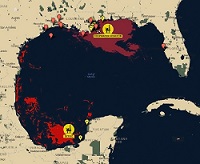
A map of the Gulf of Mexico that shows the Deepwater Horizon and Ixtoc spills. Image provided by C-IMAGE
(Click to enlarge image…)
Scientists and outreach personnel created an on-line resource that examines two major oil spills in the Gulf of Mexico: The Deepwater Horizon in the northern Gulf and the Ixtoc in the southern Gulf. The Beneath the Horizon website, developed by the Center for Integrated Modeling and Analysis of Gulf Ecosystems (C-IMAGE) research group and Jake Price Productions, explores these spills, the people who coped with and responded to these disasters, and expectations for recovery.
C-IMAGE researchers have studied the tale of these two spills since 2015 with the goal of anticipating the decadal impacts in the northern Gulf through evidence found in the southern Gulf. Beneath the Horizon’s resources take a personal look at the resilience of the people living off the Gulf’s resources.
Timelines
The Deepwater Horizon timeline shows 35 significant events from the 2010 blowout. It starts with the well explosion on April 20, 2010 then moves through events such as the unsuccessful attempts to cap the well and dispersant applications. The timeline ends with the White House Oil Commission’s determination of responsible parties on January 6, 2011.
The Ixtoc I timeline shows 10 significant events from the blowout on June 4, 1979, including unsuccessful attempts to cap the well and application of dispersant. The timeline ends with the capping of the well nine months later and the spill fate report produced on April 1, 1980 by the Mexican-owned oil company, PEMEX.
Maps
Using the interactive oil spill map, you can view and compare the extent of the spills, the areas where there was loss of recreational land use, and the locations of oiled beaches.
Historic spills from around the world are featured on the map depicting the sizes of spills, the types of oil spilled, and the ongoing impacts.
Audios/Videos
Five videos and six podcasts feature scientists who have devoted their lives to studying spills and residents who lived through them. Their first-hand accounts of experiences add the all-important human element to the research about and recovery from the Deepwater Horizon event.
Director’s Reflections
Putting together a resource like Beneath the Horizon requires getting to know the scientists who are studying these spills and the people whose lives and livelihoods were affected by these disasters. Read the director’s personal perspective of his journeys to Plaquemines Parish, Louisiana and Mexico’s Campeche, Tabasco, and Veracruz shorelines.
Learn More
- OneGulf Voyage Gathers Unprecedented Marine Samples for Two Oil Spills
- Researchers Seek New Insights from Decades-Old Spill
- Story Collider Unites Community, Research, and Restoration
************
This research was made possible in part by a grant from the Gulf of Mexico Research Initiative (GoMRI) to the Center for the Integrated Modeling and Analysis of Gulf Ecosystems II (C-IMAGE II).
The Gulf of Mexico Research Initiative (GoMRI) is a 10-year independent research program established to study the effect, and the potential associated impact, of hydrocarbon releases on the environment and public health, as well as to develop improved spill mitigation, oil detection, characterization and remediation technologies. An independent and academic 20-member Research Board makes the funding and research direction decisions to ensure the intellectual quality, effectiveness and academic independence of the GoMRI research. All research data, findings and publications will be made publicly available. The program was established through a $500 million financial commitment from BP. For more information, visit http://gulfresearchinitiative.org/.
© Copyright 2010- 2017 Gulf of Mexico Research Initiative (GoMRI) – All Rights Reserved. Redistribution is encouraged with acknowledgement to the Gulf of Mexico Research Initiative (GoMRI). Please credit images and/or videos as done in each article. Questions? Contact web-content editor Nilde “Maggie” Dannreuther, Northern Gulf Institute, Mississippi State University (maggied@ngi.msstate.edu).
